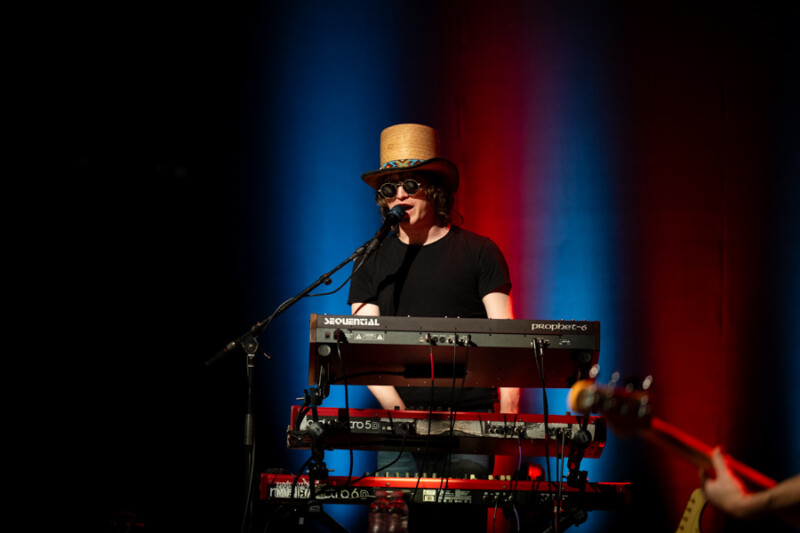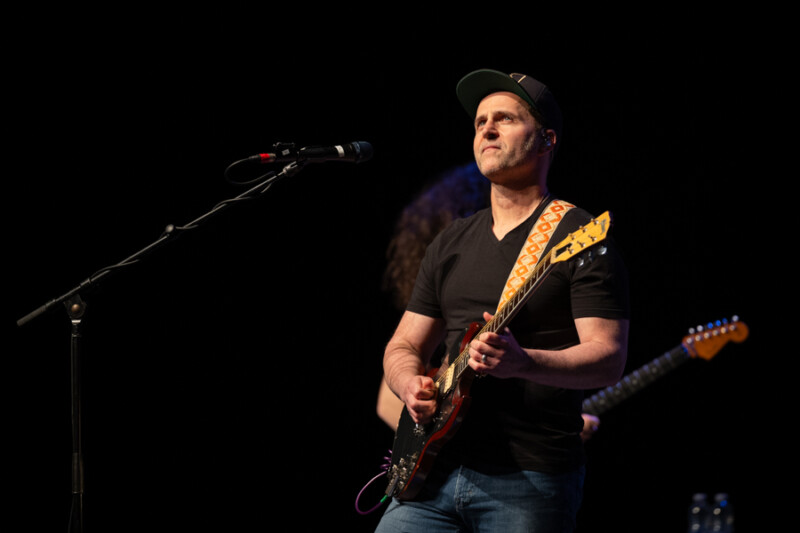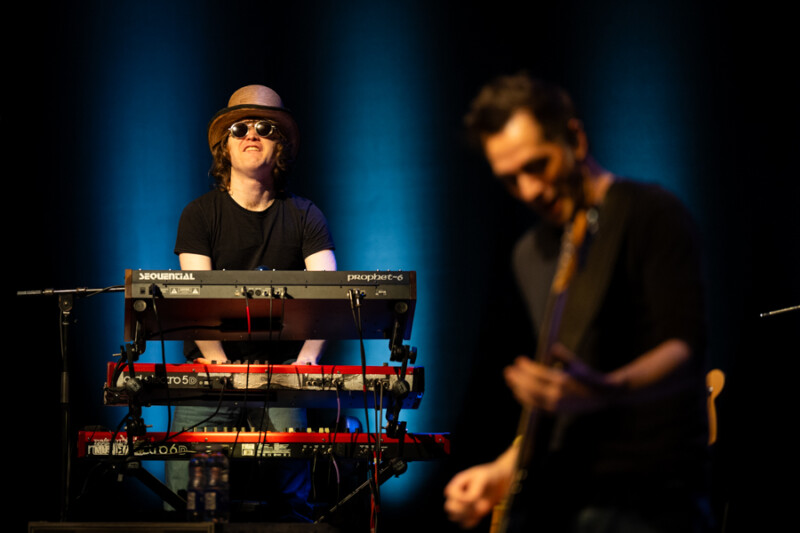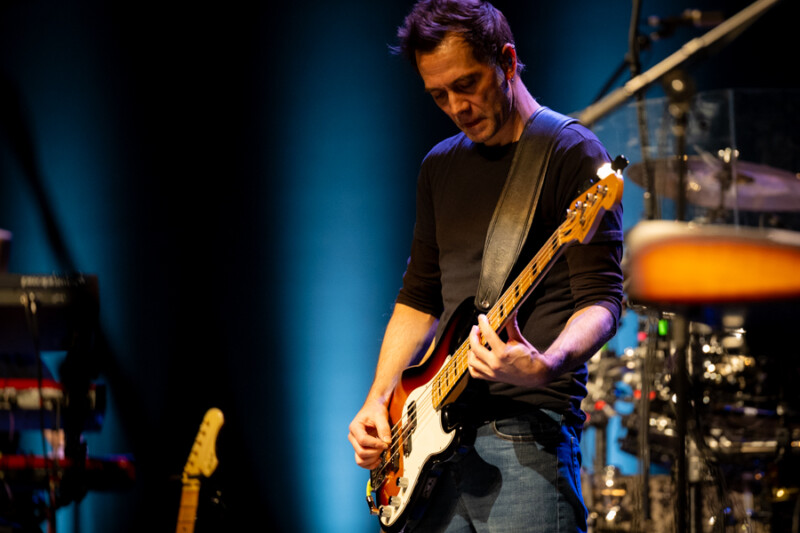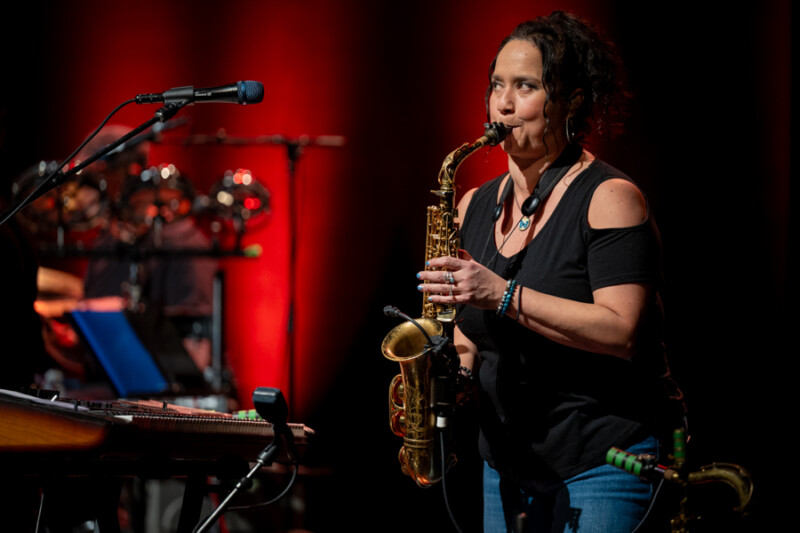
April 21, 2025
Dweezil Zappa brings his show to Montreal’s Théâtre Maisonneuve
There is no shortage of people in this world who wholeheartedly believe the pinnacle of every musical artist’s vision should be to write new music, contending that this is universally the most virtuous usage of their talents. There are countless arguments against this position, but the simplest one can be summed up in two words: Dweezil Zappa.
Dweezil has led a very unique life. One of four children of the prolific and eccentric composer Frank Zappa, he has dedicated most of his last 20 years to assembling bands to embark on extensive world tours performing his dad’s music. This is a tremendous accomplishment, if only for the good fortune of maintaining an audience for such a niche enterprise in larger theatres for this long.
See Also: Brit Floyd at Salle Wilfrid-Pelletier, Montreal
It is not an exaggeration to say Frank Zappa was one in a billion. He released 62 albums in his lifetime, and so declaring him to be a workaholic would be an understatement. His music defies classification, as he effectively created his entirely own genre of music that was usually somewhere between rock, orchestral, experimental and jazz.
Dweezil Zappa
Dweezil may not have composed this music, but he deeply understands it to the point that he is always able to perform it to the same high standard as his father did, and he manages to field ensembles of musicians appropriate for the period of music being covered on a particular tour. He and his musicians are obviously exceptionally good at what they do, as the music is often very complex with its irregular structure, tempo and key changes, and sudden cues that only the finest of musicians can be on the ready for. To find equally talented musicians is one thing, but ensuring they are also great people to work with and hang out with between gigs, which is the 18 hours of the day when you’re not working, is another. Until you’re as big as the Eagles, you’re on a tour bus and in each other’s space all the time. And playing music that requires this level of attention to detail bonds these musicians together in ways most bands do not. Lesser musicians would be intimated by this. These players are not jobbers. It is plainly evident from watching the joy on their faces that it is not just a band — it’s a family.
After the first song, Dweezil began by mentioning how he was playing some of his dad’s guitars, referring to the Gibson SG he was playing in that moment as the “Roxy guitar,” as in the one Frank played at the concerts recorded for the 1974 album Roxy and Elsewhere. The audience knew exactly what this meant and reacted to it appropriately. And upon stating this, one can’t help but realize that his guitar tone is identical to his dad’s, with a wah pedal slightly rolled back, which is a primary ingredient of that unique sound. Underneath this banter was the band playing the intro to “Don’t Eat the Yellow Snow.” There are not too many bands who will do a vamp in 7/4 time.
What makes this show truly remarkable is that it’s a six-piece band, not 10 to 15 as Frank usually had. It’s expensive to tour a band, with visas for international gigs and food and accommodations having to be covered on off nights (this is why the original Mothers of Invention broke up, after all). Dweezil is definitely not doing this to get rich. It’s entirely for the love of the music. He had a smile pasted on his face for what seemed like half the show, sometimes simply watching his musicians in admiration like a proud papa for what they do night after night for months on end.
And with only six musicians on stage, there was a lot of double-dipping. Scheila Gonzalez primarily played tenor and baritone sax, but also flute, keyboards and percussion. Guitarist Zak Tabori also doubled on drums and percussion. And they all sing, and sometimes even speak with Frank’s unique infections. It all feels like a genuine celebration of both Frank’s music and his character, and it never seems forced. And yet all of these musicians’ individual personalities shine through. It’s a delicate balance, and they somehow achieve it.
Much of what they do is faithful recreations of Frank’s eclectic compositions, often going as far as replicating particular versions of songs from a live album or even concert recordings that were never released. But to reduce Dweezil’s act to a tribute band would be unfair, as they also create new versions of many of the songs with musical or lyrical changes, not to mention covering other artists — but always in Frank’s spirit. Using a duck call goes back to Zappa’s earliest albums where he was parodying 1960s popular music and culture, and about half way through Monday’s performance in Montreal, Dweezil promised a song to be “something so emotional that will bring tears to the entire audience.” The duck call was employed by Gonzalez to hilarious effect on Lionel Richie’s “Hello” and then Bon Jovi’s “Livin’ on a Prayer,” both of which were just a single verse and chorus. A snippet of “O Canada” was added almost obligatorily, but in the current political climate it was certainly appreciated more than it ordinarily would have been.
But the covers were ultimately a brief interlude. Otherwise they entirely focused on the 1969-79 era of Frank’s canon, which is immense with 24 albums of material, plus a plethora of archival releases from the period since then. The audience for this music is extremely dedicated and passionate. At one point someone shouted “Dweezil ripped my flesh!” referencing the 1970 album title of nearly the same name, which was met with a chorus of laughter.
I often found myself grinning from ear to ear, as humour is central to Frank’s music. “Approximate” is one of his many gems — a piece of music where only the rhythm of the melody was composed. It stays the same, but the chosen notes played or sung with that rhythm are different every night, ensuring no two performances of the song are the same. It was truly a marvel and a privilege to witness this in person.
The second movement of “Approximate” was a dance-off between the five touring band members, with Dweezil asking the audience to be the adjudicators. Some of the gags were reenactments of those done by Frank in the 1970s, but for the Montreal crowd the prize for winning this competition would be a “BeaverTail poutine.” Dweezil joked that the band will have to eat it before they cross the border. References to the current state of the world are inescapable.
Another highlight of the show was keyboardist Bobby Victor singing lead on Van Halen’s “Push Comes to Shove,” a song which Dweezil rightly pointed out that Van Halen never played live in their heyday. At this point I realized his speaking voice is a cross between dad and David Lee Roth. Van Halen is deeply important to Dweezil, not just because Eddie was a massive influence on him as a guitarist, but because Eddie was the first person to call in 1993 after Frank died. Donning a top hat, Victor proved himself to be a charismatic frontman and an incredible dancer. You get your money’s worth when you see any incarnation of this band.
What followed was the pièce de résistance. The master of ceremonies revealed that the first Frank Zappa song Zak Tabori had ever heard was “Punky’s Whips,” in the form of a video of Dweezil’s band that he’d seen on YouTube when he was 12. Dweezil said Tabori was keen to play the song on this tour, but insisted there was a catch — “We’ve made it so that he has to play as many instruments as possible and give himself the least amount of time to get to the next instrument.” There is nothing in this world that is simultaneously so chaotic and so beautiful as watching this music performed in this way.
The last song of the set proper was “Zombie Woof.” There was a special moment for me personally at the end of the guitar solo where Dweezil got yet another huge applause, and in that moment I realized the obvious: this is the closest I’ll ever come to seeing Frank Zappa.
Read More:
>> While She Sleeps at L’Olympia, Montreal
>> Kylie Minogue at Bell Center, Montreal
>> The Damn Truth at Mtelus, Montreal
About half of the musicians from the 1960s and ’70s are retired or dead, and shows like this keep music alive in the same way symphony orchestras perform Beethoven. And it could not be fully appreciated without a good sound mix. You could hear every note and every word from the first downbeat, and needless to say this is not an easy band to mix. After the house lights came on I told the sound engineer that his mix was brilliant. Pro tip: the next time you see a show that sounds great, tell the front of house tech that they did a good job. They will love you for it.
Five stars out of five.
Dweezil Zappa and his band are on tour through May 3, with Canadian stops in Québec City and Toronto on April 25 and 26 respectively.


